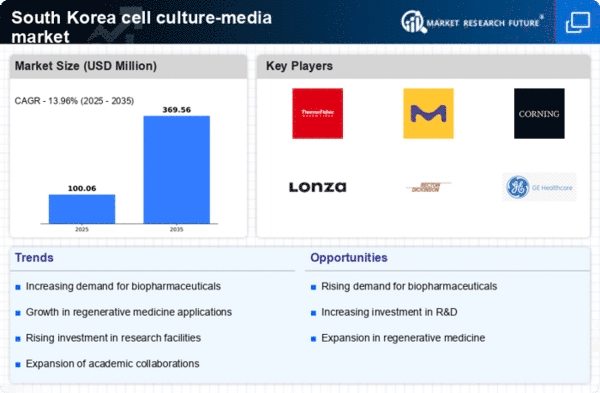Expansion of Biotech Startups
The burgeoning ecosystem of biotechnology startups in South Korea is a key driver for the cell culture-media market. These startups are increasingly focusing on developing novel biopharmaceuticals and therapies, which necessitate the use of advanced cell culture techniques. The South Korean government has been supportive of this trend, providing funding and resources to foster innovation in the biotech sector. As of 2025, the number of biotech startups has increased by over 20% compared to previous years, indicating a vibrant entrepreneurial landscape. This expansion is likely to create a heightened demand for diverse cell culture media, as startups require various formulations to support their research and development efforts. Thus, the cell culture-media market stands to benefit from this dynamic growth in the biotech startup ecosystem.
Increasing Research Activities
The cell culture-media market in South Korea is experiencing a surge in research activities, particularly in the fields of biotechnology and pharmaceuticals. This increase is driven by the growing need for innovative therapies and drug development. Research institutions and universities are investing heavily in cell culture techniques, which are essential for studying cellular processes and developing new treatments. According to recent data, the research expenditure in South Korea has risen by approximately 10% annually, indicating a robust commitment to advancing scientific knowledge. This trend is likely to bolster the demand for high-quality cell culture media, as researchers require specialized formulations to support their experiments. Consequently, the cell culture-media market is poised for growth as it aligns with the expanding research landscape in the country.
Growing Focus on Regenerative Medicine
The increasing focus on regenerative medicine is emerging as a significant driver for the cell culture-media market in South Korea. As the healthcare sector seeks to develop therapies that can repair or replace damaged tissues and organs, the need for specialized cell culture media becomes paramount. Regenerative medicine relies heavily on stem cell research, which requires specific media formulations to support cell growth and differentiation. The market for regenerative medicine is projected to expand rapidly, with estimates indicating a growth rate of approximately 18% over the next five years. This trend suggests a corresponding increase in the demand for high-quality cell culture media tailored for regenerative applications, thus positioning the cell culture-media market for substantial growth.
Rising Adoption of Personalized Medicine
The shift towards personalized medicine is significantly influencing the cell culture-media market in South Korea. As healthcare providers increasingly focus on tailored treatments, the demand for specific cell culture media that can support personalized therapies is on the rise. This trend is particularly evident in oncology, where patient-specific cell lines are utilized for drug testing and development. The market for personalized medicine is projected to grow at a CAGR of around 15% over the next five years, suggesting a corresponding increase in the need for specialized cell culture media. Companies are likely to invest in developing innovative media formulations that cater to the unique requirements of personalized therapies, thereby driving growth in the cell culture-media market.
Technological Advancements in Cell Culture
Technological advancements in cell culture techniques are playing a pivotal role in shaping the cell culture-media market in South Korea. Innovations such as 3D cell culture systems and automated cell culture processes are enhancing the efficiency and effectiveness of cell-based research. These advancements allow for more accurate modeling of human tissues and diseases, which is crucial for drug development and testing. The market for advanced cell culture technologies is expected to grow significantly, with estimates suggesting a CAGR of around 12% over the next few years. As researchers adopt these new technologies, the demand for compatible cell culture media that can support these systems is likely to increase, thereby driving growth in the cell culture-media market.




















Leave a Comment